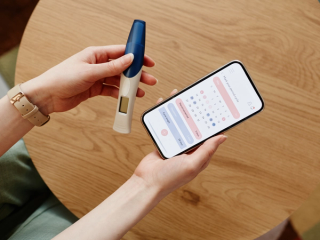
- Home
- Advice Hub
- Conception
- Fertility & Infertility
- Diagnosing Infertility And Treatment
Diagnosing Infertility and Treatment
Discover the key steps in diagnosing infertility and explore effective treatment options to help you on your journey to parenthood.
Diagnosing Infertility and Treatment
If you’re trying to conceive and are unsuccessful, your thoughts may be turning to why and what you can do next?
Infertility is very common, impacting 1 in 7 couples1. However, struggling to conceive can feel very isolating, especially when all around you friends and family members are having children and creating their families.
The first step in progressing on your fertility journey is taking action to discover what might be causing the problem. We recommend seeing your doctor as soon as you are concerned, however the general recommendations are if you are under the age of 35 and have been trying to conceive for 12 months, then this is the time to see your doctor. If you are 36 or over then you only need to try for 6 months2.
What causes infertility?
Female infertility can be caused by a number of underlying conditions3. Below is a list of the most common reasons why you may be struggling to conceive:
- Polycystic Ovary Syndrome - affecting 1:10 women
- Endometriosis – affecting 1:10 women
- Blocked fallopian tubes – caused by infection such as Pelvic Inflammatory Disease or from scarring
- Thyroid condition – underactive or overactive
- Hypothalamic amenorrhoea
- Male factor infertility – poor sperm parameters impacting on the amount, shape and motility of the sperm
- Uterine abnormalities – such as fibroids
- Premature Ovarian Insufficiency
- Medication and drugs – chemotherapy and illegal drugs may impact fertility
- Irregularity or infrequent sex
However, in 25% of cases no cause of the fertility problem can be established4, and this is generally diagnosed as unexplained infertility.
What are the signs something may be wrong?
If you are worried about your fertility, then we recommend seeing your doctor to discuss your concerns as soon as possible. Here are some of the signs that something may not be quite right, however, it is important to be aware that it is possible to suffer with infertility without there being any obvious signs or symptoms.
- Irregular or absent periods
- Heavy and painful periods
- Trying to conceive with regular sexual intercourse for 12 months or longer
- Previous medical history of pelvic inflammatory disease
- Elevated or low BMI – a normal BMI is 18-25
- Smoking or recreational drug use
- Age – it may be more difficult to conceive after the age of 35
- Recurrent miscarriage
- Regular hot flushes or night sweats
How do you diagnose infertility?
When trying to conceive, it can be confusing to know what tests to ask your doctor for. Here’s how to check your fertility, the most common tests for both men and women and when to ask your doctor for these.
Tests for women:
The first tests you can do, to find out a little more about your reproductive health, are blood tests. You can do these at any time; however, we recommend within the first few months of trying to conceive. These are easy to do, and you can either ask your doctor for these or access ‘at home’ testing from online providers. The blood tests you would want to check are:
- Full hormone profile - oestradiol, FSH, LH and progesterone
- Thyroid – TSH, T3, T4 and thyroid antibodies
- Prolactin
- Vitamin D
These tests look at your reproductive health and check to see if you are ovulating. At this stage you may also want to have a sexual health screen. You can access a sexual health screen either through your GP, local sexual health clinic or via an online provider.
If you have been trying to conceive for over 6 months, if 36 years of age or over, or 12 months under the age of 35, then now is the time to ask your doctor for further investigations. This may include:
1. Ultrasound scan to check the uterus and ovaries and possibly count the follicles in the ovaries (Antral Follicle Count scan)
2. Blood tests to check ovarian reserve (Anti-Mullerian Hormone). This may only be available privately
3. Referral to fertility for investigations such as a Hy-CoSy (https://www.buckshealthcare.nhs.uk/pifs/hystero-contrast-sonography-hycosy/) or similar procedure
A referral to fertility will also involve a consultation with a specialist to discuss your options.
Test for men:
At the same time you have routine blood tests, your male partner can access his doctor to request a sperm test.
If a sperm test shows any abnormalities, your partner will be advised to repeat this in 3 months. If male factor fertility issues are identified, then, as a couple, you will be referred to fertility. You may also want to investigate the cause of the male factor issue by asking your doctor for a referral to a urologist.
At this stage, your partner may also wish to access a sexual health screen.
Some couples decide to look further into the health if the sperm by accessing a sperm DNA fragmentation test. This test is currently only available privately.
What questions will my doctor ask me?
Your doctor may ask you a few questions to determine if there are any reasons why you might not be falling pregnant. Below are the most common questions that might help you be prepared for your consultation with your doctor:
- How long have you been trying to conceive?
- Have you used/when did you cease hormonal contraception?
- Do you have any medical or gynaecological history? – such as previously diagnosed PCOS or endometriosis etc
- Have you had any previous pregnancies, miscarriages, or abortions? -If you have children, your GP may ask about your deliveries and whether you experienced any problems in pregnancy or at delivery.
- What prescribed medication are you taking and are you taking any supplements?- it is important to start taking folic acid and vitamin D when trying to conceive.
- How frequently do you have sexual intercourse? – it is recommended to have sex every 2-3 days throughout the cycle
- Have you or your partner ever had a sexually transmitted infection?
- What is the length of your cycle and are your periods regular? – lengthy or irregular periods may indicate an ovulatory disorder such as PCOS
- Do you have heavy or painful periods, and do you have any pain during or after sex? – these can be symptoms of endometriosis or fibroids
- Do you smoke/vape? How much alcohol do you drink? Do you exercise and have a healthy diet?- your doctor may also enquire about your weight and BMI
It is important to remember that having any of the symptoms listed above does not necessarily mean that you have any issues impacting your fertility. However, your answers will help your doctor to determine whether further investigations will help you.
What are the main types of fertility treatments?
Fertility treatments are available both on the NHS and privately. You may need to speak with your doctor to see if you are eligible for NHS fertility treatment.
Fertility treatments for women
Ovulation Induction
Is the treatment to induce ovulation in a woman who is not ovulating or may not be ovulating regularly. This is used predominantly for women with ovulation disorders such as PCOS or hypothalamic amenorrhoea.
Gynaecological surgery
Although this is not strictly a fertility treatment, minor surgery such as a laparoscopy may be used to investigate conditions such as endometriosis and remove any endometriosis lesions and scar tissue. This may improve fertility for women suffering from this condition.
Intrauterine Insemination (IUI)
Intrauterine insemination (IUI) is a fertility treatment that involves directly inserting sperm into a woman's womb. This may be accompanied by taking medication to mature an egg for ovulation and ensure that the womb lining is ready to accept an implanting pregnancy. This procedure is however used less frequently now for heterosexual couples but is the main fertility treatment for same sex female couples.
In vitro fertilisation (IVF)
Is an assisted technology used to help with infertility. An egg is removed from the woman's ovaries and fertilised with sperm in a laboratory. The process involves suppressing, monitoring, and stimulating a woman’s ovaries, removing the eggs and placing them with the sperm to fertilise in the laboratory. The embryo is then either transferred into the womb 3-6 days after fertilisation or frozen for transfer at a later date.
Fertility treatments for men
IVF techniques, such as intracytoplasmic sperm injection (ICSI), is a common and effective treatment for many types of male factor infertility. In the laboratory a single healthy sperm is injected into the egg, bypassing any potential problems the sperm may have in getting inside the egg.
In summary, we think it’s much better to take early action, rather than waiting, to find out if there is anything impacting your fertility and give you some reassurance. Speaking to your doctor will help you devise a pathway to understanding your fertility better and feel empowered to make the right decisions for you. If you are at all concerned about your fertility or think you, or your partner, may have a condition that is making it more difficult to conceive, don’t delay in speaking to your doctor.
References
- NICE (2017) Fertility Problems: Assessment and treatment https://www.nice.org.uk/guidance/cg156/chapter/context Last accessed 3/04/24
- NHS (2023) Diagnosis Infertility https://www.nhs.uk/conditions/infertility/diagnosis/ Last accessed 3/4/24
- British Fertility Society (2024) What is Infertility? https://www.britishfertilitysociety.org.uk/fei/what-is-infertility/ Last accessed 4/04/24
- Hart R. Unexplained infertility, endometriosis, and fibroids. BMJ. 2003;327(7417):721-724. doi:10.1136/bmj.327.7417.721











